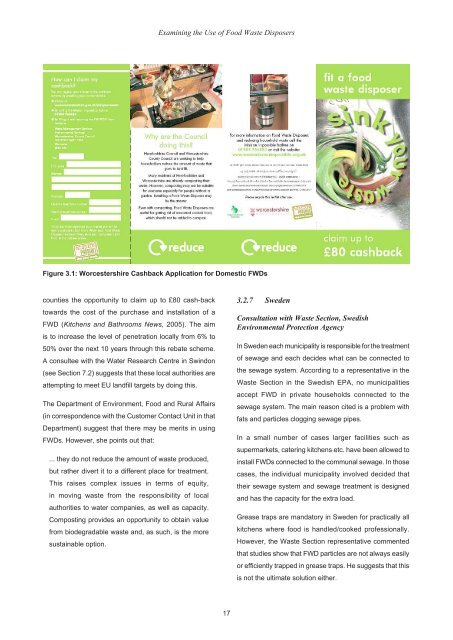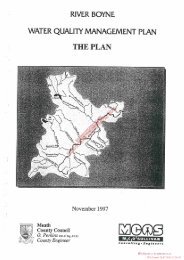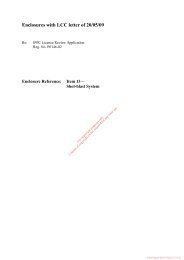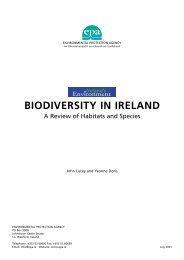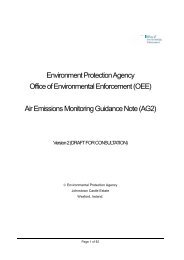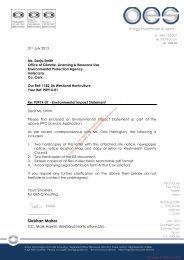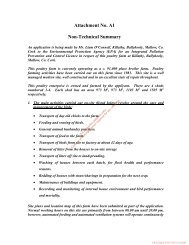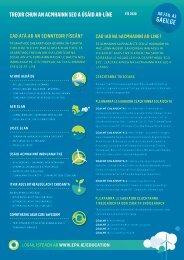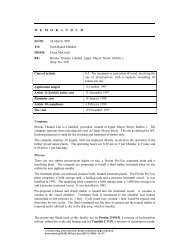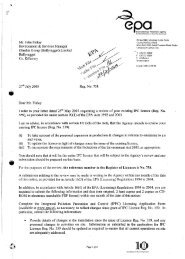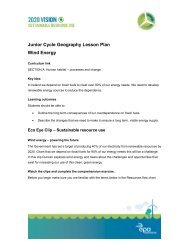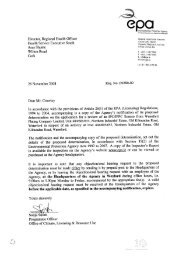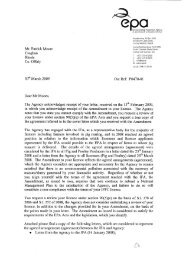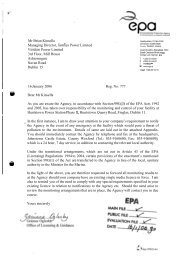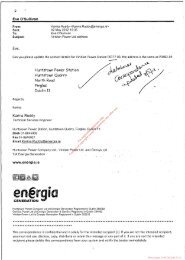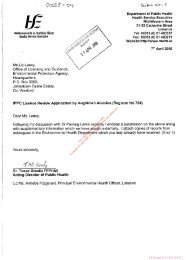Examining the Use of Food Waste Disposers - Environmental ...
Examining the Use of Food Waste Disposers - Environmental ...
Examining the Use of Food Waste Disposers - Environmental ...
Create successful ePaper yourself
Turn your PDF publications into a flip-book with our unique Google optimized e-Paper software.
counties <strong>the</strong> opportunity to claim up to £80 cash-back<br />
towards <strong>the</strong> cost <strong>of</strong> <strong>the</strong> purchase and installation <strong>of</strong> a<br />
FWD (Kitchens and Bathrooms News, 2005). The aim<br />
is to increase <strong>the</strong> level <strong>of</strong> penetration locally from 6% to<br />
50% over <strong>the</strong> next 10 years through this rebate scheme.<br />
A consultee with <strong>the</strong> Water Research Centre in Swindon<br />
(see Section 7.2) suggests that <strong>the</strong>se local authorities are<br />
attempting to meet EU landfill targets by doing this.<br />
The Department <strong>of</strong> Environment, <strong>Food</strong> and Rural Affairs<br />
(in correspondence with <strong>the</strong> Customer Contact Unit in that<br />
Department) suggest that <strong>the</strong>re may be merits in using<br />
FWDs. However, she points out that:<br />
... <strong>the</strong>y do not reduce <strong>the</strong> amount <strong>of</strong> waste produced,<br />
but ra<strong>the</strong>r divert it to a different place for treatment.<br />
This raises complex issues in terms <strong>of</strong> equity,<br />
in moving waste from <strong>the</strong> responsibility <strong>of</strong> local<br />
authorities to water companies, as well as capacity.<br />
Composting provides an opportunity to obtain value<br />
from biodegradable waste and, as such, is <strong>the</strong> more<br />
sustainable option.<br />
<strong>Examining</strong> <strong>the</strong> <strong>Use</strong> <strong>of</strong> <strong>Food</strong> <strong>Waste</strong> <strong>Disposers</strong><br />
Figure 3.1: Worcestershire Cashback Application for Domestic FWDs<br />
17<br />
3.2.7 Sweden<br />
Consultation with <strong>Waste</strong> Section, Swedish<br />
<strong>Environmental</strong> Protection Agency<br />
In Sweden each municipality is responsible for <strong>the</strong> treatment<br />
<strong>of</strong> sewage and each decides what can be connected to<br />
<strong>the</strong> sewage system. According to a representative in <strong>the</strong><br />
<strong>Waste</strong> Section in <strong>the</strong> Swedish EPA, no municipalities<br />
accept FWD in private households connected to <strong>the</strong><br />
sewage system. The main reason cited is a problem with<br />
fats and particles clogging sewage pipes.<br />
In a small number <strong>of</strong> cases larger facilities such as<br />
supermarkets, catering kitchens etc. have been allowed to<br />
install FWDs connected to <strong>the</strong> communal sewage. In those<br />
cases, <strong>the</strong> individual municipality involved decided that<br />
<strong>the</strong>ir sewage system and sewage treatment is designed<br />
and has <strong>the</strong> capacity for <strong>the</strong> extra load.<br />
Grease traps are mandatory in Sweden for practically all<br />
kitchens where food is handled/cooked pr<strong>of</strong>essionally.<br />
However, <strong>the</strong> <strong>Waste</strong> Section representative commented<br />
that studies show that FWD particles are not always easily<br />
or efficiently trapped in grease traps. He suggests that this<br />
is not <strong>the</strong> ultimate solution ei<strong>the</strong>r.


